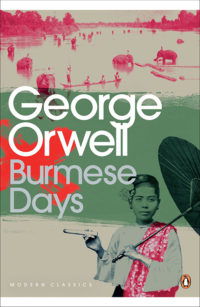Free speech is unthinkable
 Burmese Days
Burmese Days
by George Orwell
I’m always nervous of contemporary books about colonialism but I figured I’d be in safe hands with Orwell. Like A Passage to India, the major theme is the racism inherent to colonialism, but Orwell does a better job than Forster of clearly separating his characters’ racism from his own opinions on the subject.
The first character we meet is U Po Kyin, a middle-ranking Burmese official who has plotted and bribed his way to where he is and continues to plot his way further up. The next step in his plan is to destroy the reputation of Dr Veraswami, the local doctor. The biggest hurdle he faces is that the doctor is friends with Mr Flory – a white British man, in a country where the ruling British are unassailable.
For the most part the rest of the novel follows Flory as he tries to keep a grip on his awkward position in society. They’re in a small town in northern Burma and the Europeans-only Clubhouse has just eight members, most of whom are, like Flory, timber merchants who spend most of their time in the jungle. Aside from Flory they keep themselves apart from the native population and refer to them with racial epithets that are shocking to modern ears, and I suspect even at the time would have been frowned on “back home”. Flory makes clear by his friendship with the doctor that he doesn’t agree with the prevailing opinion, but he rarely opens his mouth to object when racist things are said.
“[Flory said,] ‘I don’t want the Burmans to drive us out of the country. God forbid! I’m here to make money, like everyone else. All I object to is the slimy white man’s burden humbug. The pukka sahib pose. It’s so boring. Even those bloody fools at the Club might be better company if we weren’t all of us living a lie the whole time.’
‘But, my dear friend, what lie are you living?’
‘Why, of course, the lie that we’re here to uplift our poor black brothers instead of to rob them. I suppose it’s a natural enough lie. But it corrupts us, it corrupts us in ways you can’t imagine. There’s an everlasting sense of being a sneak and a liar that torments us and drives us to justify ourselves night and day. It’s at the bottom of half our beastliness to the natives.’ ”
Two things come along to change this state of complaisance. Dr Veraswami becomes aware of U Po Kyin’s plans and asks Flory to nominate him for Club membership. This seems like an empty request that Flory can easily agree to until Mr Macgregor, the Club chairman, drops the bombshell that he has been commanded to add one native to the Club’s roster. Flory must now wrestle with his conscience until the next formal meeting of the Club.
The other interruption to life-as-normal is the arrival of the beautiful young woman Elizabeth Lackersteen, come to stay with her aunt and uncle in Burma after the death of her parents. Flory is immediately attracted to Miss Lackersteen, partly because she has lived in Paris and therefore represents all the art and culture that he can’t talk about with the other Club members. She’s an opportunity for change, but she’s also not the person Flory wants her to be and only desperation to get away from her lecherous uncle keeps her spending time with Flory.
“It is a stifling, stultifying world in which to live. It is a world in which every word and every thought is censored…even friendship can hardly exist when every white man is a cog in the wheels of despotism. Free speech is unthinkable. All other kinds of freedom are permitted. You are free to be a drunkard, an idler, a coward, a backbiter, a fornicator; but you are not free to think for yourself. Your opinion on every subject of any conceivable importance is dictated for you by the pukka sahibs’ code.”
This is a really enjoyable story about a troubling time in history that tackles those troubles head-on. It is told from the European perspective so we don’t really get to see how any of the native characters feel about circumstances, but we do get a range of European views.
Orwell isn’t entirely innocent of racism. The non-European characters are little more than caricatures. U Po Kyin is an almost cartoonish baddie, a figure of fun. Dr Veraswami is fawning to an embarrassing degree. Flory’s servant Ko S’la literally calls him a god. But Orwell does make it very clear that he disagrees with both the outright racism of most of the Europeans and the ambivalence of Flory.
The edition I have includes an insightful introduction by Emma Larkin, on the back of which I have already bought her book Finding George Orwell in Burma.
First published 1934 by Harper.
Source: Christmas present from my Dad.